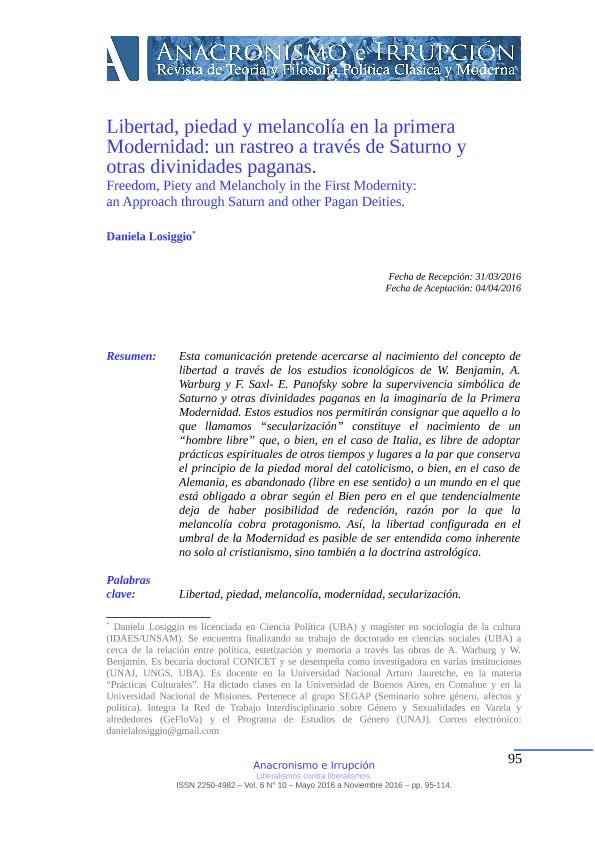Mostrar el registro sencillo del ítem
dc.contributor.author
Losiggio, Daniela

dc.date.available
2020-04-15T18:29:03Z
dc.date.issued
2016-05
dc.identifier.citation
Losiggio, Daniela; Libertad, piedad y melancolía en la primera Modernidad: un rastreo a través de Saturno y otras divinidades paganas; Universidad de Buenos Aires. Facultad de Ciencias Sociales. Instituto de Investigaciones Gino Germani; Anacronismo e Irrupción; 6; 10; 5-2016; 95-114
dc.identifier.issn
2250-4982
dc.identifier.uri
http://hdl.handle.net/11336/102654
dc.description.abstract
Esta comunicación pretende acercarse al nacimiento del concepto de libertad a través de los estudios iconológicos de W. Benjamin, A. Warburg y F. Saxl- E. Panofsky sobre la supervivencia simbólica de Saturno y otras divinidades paganas en la imaginaría de la Primera Modernidad. Estos estudios nos permitirán consignar que aquello a lo que llamamos "secularización" constituye el nacimiento de un "hombre libre" que, o bien, en el caso de Italia, es libre de adoptar prácticas espirituales de otros tiempos y lugares a la par que conserva el principio de la piedad moral del catolicismo, o bien, en el caso de Alemania, es abandonado (libre en ese sentido) a un mundo en el que está obligado a obrar según el Bien pero en el que tendencialmente deja de haber posibilidad de redención, razón por la que la melancolía cobra protagonismo. Así, la libertad configurada en el umbral de la Modernidad es pasible de ser entendida como inherente no solo al cristianismo, sino también a la doctrina astrológica.
dc.description.abstract
This communication intends to approach to the birth of the concept of freedom through the iconological studies of W. Benjamin, A. Warburg and F. E. Panofsky Saxl- on the symbolic survival of Saturn and other pagan deities in the imaginary of the First Modernity. These studies allow us to state that what we call "secularization" is the birth of a "free man" that, either, in the case of Italy, it is free to adopt spiritual practices of other times and places at the same time preserves the principle of moral piety of Catholicism, or, in the case of Germany, is abandoned (free in that sense) to a world in which it is obligated to act in the good but in which tendentiously there is no longer any possibility of redemption, reason for which melancholy takes prominence. Thus, freedom, shaped on the dawn of Modernity is liable to be understood as inherent not only to Christianity, but also the astrological doctrine.
dc.format
application/pdf
dc.language.iso
spa
dc.publisher
Universidad de Buenos Aires. Facultad de Ciencias Sociales. Instituto de Investigaciones Gino Germani

dc.rights
info:eu-repo/semantics/openAccess
dc.rights.uri
https://creativecommons.org/licenses/by-nc-sa/2.5/ar/
dc.subject
Libertad
dc.subject
Piedad
dc.subject
Melancolía
dc.subject
Secularización
dc.subject.classification
Otras Ciencia Política

dc.subject.classification
Ciencia Política

dc.subject.classification
CIENCIAS SOCIALES

dc.title
Libertad, piedad y melancolía en la primera Modernidad: un rastreo a través de Saturno y otras divinidades paganas
dc.title
Freedom, Piety and Melancholy in the First Modernity: an Approach through Saturn and other Pagan Deities
dc.type
info:eu-repo/semantics/article
dc.type
info:ar-repo/semantics/artículo
dc.type
info:eu-repo/semantics/publishedVersion
dc.date.updated
2020-03-05T13:36:11Z
dc.journal.volume
6
dc.journal.number
10
dc.journal.pagination
95-114
dc.journal.pais
Argentina

dc.journal.ciudad
Ciudad Autónoma de Buenos Aires
dc.description.fil
Fil: Losiggio, Daniela. Consejo Nacional de Investigaciones Científicas y Técnicas; Argentina. Universidad Nacional de General Sarmiento; Argentina. Universidad Nacional Arturo Jauretche; Argentina
dc.journal.title
Anacronismo e Irrupción
dc.relation.alternativeid
info:eu-repo/semantics/altIdentifier/url/https://publicaciones.sociales.uba.ar/index.php/anacronismo/article/view/1770
Archivos asociados
